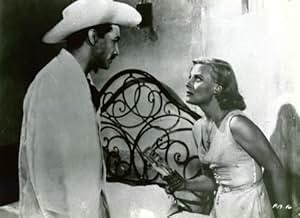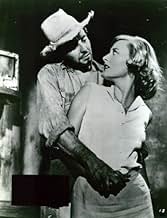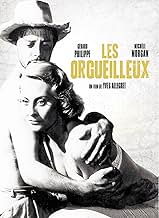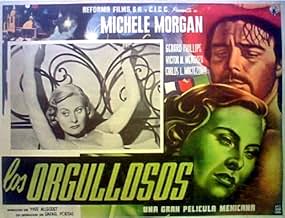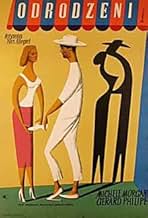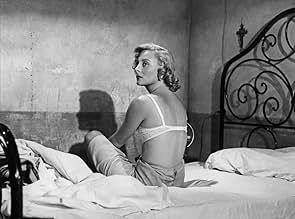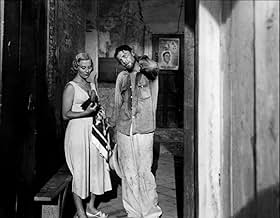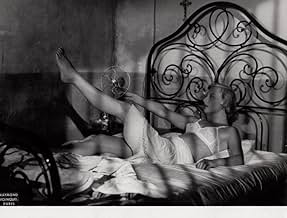अपनी भाषा में प्लॉट जोड़ेंLife in a small Mexican village where joy and misery, hope and pain, passion and guilt, love and decay, life and death are mixed in the peasants life and two French citizens who end up stran... सभी पढ़ेंLife in a small Mexican village where joy and misery, hope and pain, passion and guilt, love and decay, life and death are mixed in the peasants life and two French citizens who end up stranded in there, during a typhoid epidemic.Life in a small Mexican village where joy and misery, hope and pain, passion and guilt, love and decay, life and death are mixed in the peasants life and two French citizens who end up stranded in there, during a typhoid epidemic.
- 1 ऑस्कर के लिए नामांकित
- 1 जीत और कुल 3 नामांकन
Luis Buñuel
- Smuggler
- (बिना क्रेडिट के)
फ़ीचर्ड समीक्षाएं
I saw this movie when it first came out, have not seen it since, but have remembered it vividly all these years. Seldom, if ever, has a film held me riveted the way this one did. Of course, I would have paid to see Michele Morgan read the Manhattan phone book, especially attired in a slip (no, I am not a lezzie). The mood created by the meningitis epidemic in Mexico and the sexual tension, created mostly by Morgan, are more enveloping than real life. This remains one of my top 10 - perhaps top 5 - favorite movies of all time. For the life of me, I cannot understand why there is neither a VHS nor a DVD version available, apparently anywhere. What can be done to rectify this situation? For years, I moaned about the lack of a DVD of The Informer. Now, one is available but only as part of the overpriced John Ford collection of some of his lesser films.
Jen
Jen
`Les Orgueilleux' is one of a constellation of worthy French movies of this era that the French stopped making for two reasons: the complete lobotomy of the intellect that was the so-called New Wave and the premature death of Gérard Philipe, one of the century's finest actors. His pairing with Michèle Morgan here is inspired. (They also starred in René Clair's `Les Grandes Manoeuvres'.) In order to describe Philipe's charm, one has to evoke equal parts Leonardo DiCaprio and Laurence Olivier and imagine them cast as romantic leads in the kind of challenging narrative that is not even conceivable today, except for the odd exception. `Les Orgueilleux' is set during a typhus epidemic in a remote Mexican village and is based on Jean-Paul Sartre's novel `L'Amour rédempteur' (`Redeemed by Love', aka `Typhus'). The oversimplification of the novel's themes is compensated by Allégret's penchant for realism and his attention to details, like the long scene of Morgan enduring the discomfort and perils of a lonely hotel room during a heat wave in a third rate Mexican hotel, which is part striptease (daring for the time) and part psychological analysis. In other words, a perfect blend of commercialism and intelligence, both qualities sadly lacking from the aforementioned so-called New Wave.
Jean-Paul Sartre did not have much luck with his screenplays for French Pathé as only two of eight saw the light of day, one of which, 'Les Jeux sont faits' was directed by Jean Delannoy whilst the other, entitled 'Typhus', eventually surfaced some ten years later as 'Les Orgueilleux' which retained distant echoes of the original. Ironically Sartre was nominated for an Academy Award but unsurprisingly withdrew his name.
Directed and adapted by Yves Allégret with contributions from the legendary Aurenche and Bost, it is set in a fly-blown harbour town during a meningitis epidemic and stars two of France's finest, Gérard Philippe and Michele Morgan, both of whose class enables them to rise above the grubby milieu. Philippe both excels and engages one's sympathy in a role that could so easily be a caricature. Mlle Morgan's innate sensuality is singularly sweaty here and Martin Scorcese admits that the sight of her lying on a bed in her lingerie whilst cooling herself with ice cubes 'troubled his adolescence'.
Cinematographer Alex Phillips has brillianty captured the seedy surroundings and oppressive heat but the soundtrack of yelping musicians becomes rather tiresome.
The final Hollywood-style clinch is not the ending that Allégret would have chosen and was apparently shot by an operator in the Boulogne studios against a painted sky.
Allégret had reached his peak with three 'noirs' in the 1940's and this work from 1953 is generally regarded as his last film of note.
Directed and adapted by Yves Allégret with contributions from the legendary Aurenche and Bost, it is set in a fly-blown harbour town during a meningitis epidemic and stars two of France's finest, Gérard Philippe and Michele Morgan, both of whose class enables them to rise above the grubby milieu. Philippe both excels and engages one's sympathy in a role that could so easily be a caricature. Mlle Morgan's innate sensuality is singularly sweaty here and Martin Scorcese admits that the sight of her lying on a bed in her lingerie whilst cooling herself with ice cubes 'troubled his adolescence'.
Cinematographer Alex Phillips has brillianty captured the seedy surroundings and oppressive heat but the soundtrack of yelping musicians becomes rather tiresome.
The final Hollywood-style clinch is not the ending that Allégret would have chosen and was apparently shot by an operator in the Boulogne studios against a painted sky.
Allégret had reached his peak with three 'noirs' in the 1940's and this work from 1953 is generally regarded as his last film of note.
Story of a land more than story of characters. Admirable performance of Michelle Morgan. And sure, Gerard Philipe. You feel the heat and the poverty and the air. And, sure, the traits of love. A film like the picture of a world. And a love story as root of hope.
I sat through this movie this evening, forcing myself to stick with it even though I never cared about any of the characters or what happened to them, because the two leads, Gérard Philippe and Michèle Morgan, were major film stars of their era and I wanted to see them in "something different," which this certainly was. They both gave fine performances, but of distasteful characters.
Indeed, the whole movie is about a shabby little town in Mexico inhabited by almost uniformly distasteful characters (the doctor is, of course, the major exception). What Michèle Morgan ever sees in Philippe to fall in love with him is never explained.
This is supposedly based on a work by Jean-Paul Sartre. All I could think was that, if Sartre's work is anything like this movie, it must be a very mediocre attempt at imitating Camus' masterful novel The Plague, which dealt with a plague in North Africa.
A well-acted but uninteresting movie.
Indeed, the whole movie is about a shabby little town in Mexico inhabited by almost uniformly distasteful characters (the doctor is, of course, the major exception). What Michèle Morgan ever sees in Philippe to fall in love with him is never explained.
This is supposedly based on a work by Jean-Paul Sartre. All I could think was that, if Sartre's work is anything like this movie, it must be a very mediocre attempt at imitating Camus' masterful novel The Plague, which dealt with a plague in North Africa.
A well-acted but uninteresting movie.
क्या आपको पता है
- ट्रिवियाJean-Paul Sartre wrote ten drafts for screenplays to be used by Columbia Pictures, of which only three were typed down. The other seven were sort of rejected, and one of these, 'Typhus' came to be the obvious inspiration for Les orgueilleux/Los Orgullosos, Yves Allégret's co-production with Mexico. The film won the Bronze Lion in the 1953 Venice Film Festival, ex-aequo with La guerra de Dios (1953), Pickup on South Street (1953), and Sinhá Moça (1953), and also a Special Prize from the same Jury. When the film was nominated for Best Writing, Motion Picure Story, for the 1957 Academy Awards - in the wake of the film's release in the USA, with promotional materials emphasizing it was "Jean-Paul Sartre's The Proud and the Beautiful", the French philosopher disowned his authorship. The film has also been said to be based on Sartre's novel, "L'amour redempteur"... which he never wrote! This myth did not end, even after its exposure as such in "Feature Cinema in the 20th Century: Volume One: 1913-1950: a Comprehensive Guide", by By Jacek Klinowski et al.
- कनेक्शनFeatured in Censura: Alguns Cortes (1999)
टॉप पसंद
रेटिंग देने के लिए साइन-इन करें और वैयक्तिकृत सुझावों के लिए वॉचलिस्ट करें
- How long is The Proud and the Beautiful?Alexa द्वारा संचालित
विवरण
- रिलीज़ की तारीख़
- कंट्री ऑफ़ ओरिजिन
- भाषाएं
- इस रूप में भी जाना जाता है
- The Proud and the Beautiful
- फ़िल्माने की जगहें
- उत्पादन कंपनियां
- IMDbPro पर और कंपनी क्रेडिट देखें
- चलने की अवधि
- 1 घं 43 मि(103 min)
- रंग
- ध्वनि मिश्रण
- पक्ष अनुपात
- 1.37 : 1
इस पेज में योगदान दें
किसी बदलाव का सुझाव दें या अनुपलब्ध कॉन्टेंट जोड़ें

